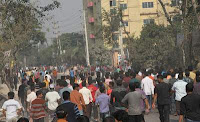Mizan and Masum are cousins: too young to understand what took away their mothers late Saturday night.
Mizan, 11 months old, and Masum, 18 months old, are now too exhausted to cry for their mothers. They were leaning against their fathers' shoulders like statues.
Both depended on mother's milk.
Almost a week had gone by since their mothers went to work at Tazreen Fashions factory in Ashulia and did not return.
Mizan's mother Mitu's body was lined up among other bodies at Nishchintapur Primary School ground Sunday morning while Masum's mother Mahfuza is missing.
Mahfuza is presumed to be among the 53 dead whose bodies were charred beyond recognition. The unidentified were buried in Jurain graveyard.
Mitu and Mahfuza had been working at Tazreen for the last two years. They married Saddam Hossain and Abdul Jabbar, brothers.
The widowers were wandering from one end to the other of Nishchintapur village yesterday looking blankly and holding their sons close to their chests.
Ruins and wreckage of the burnt factory are what they now roam around in gloom and despair in search for help.
"We do not know how we will lead the rest of our lives with the motherless kids," said Saddam, "We have to work for survival without anyone to take care of our poor sons."
The brothers came from Bhurungamari of Kurigram looking for livelihoods in the capital more than half a decade ago and got jobs as garment workers in Nishchintapur of Ashulia on the outskirts of the capital.
Jabbar married Mahfuza around six years ago while Saddam took Mitu as wife five years ago. They had been living in the same neighbourhood ever since.
"My son is missing his mother and has stopped eating…he refuses to go to anyone else," said Saddam, adding, "I am now penniless… I had to spend all my money to take my wife's body to Rangpur for burial…I can't afford to feed him."
"I can neither leave my son with anyone nor can I go to work," said Saddam, who works at a nearby garment factory.
Jabbar said his son too has stopped eating as Mahfuza used to feed her son and play with him during breaks while at work.
"What do we do now?" he said.
At least 111 garments workers perished at the factory Saturday night in the worst industrial fire in the country.
Mizan, 11 months old, and Masum, 18 months old, are now too exhausted to cry for their mothers. They were leaning against their fathers' shoulders like statues.
Both depended on mother's milk.
Almost a week had gone by since their mothers went to work at Tazreen Fashions factory in Ashulia and did not return.
Mizan's mother Mitu's body was lined up among other bodies at Nishchintapur Primary School ground Sunday morning while Masum's mother Mahfuza is missing.
Mahfuza is presumed to be among the 53 dead whose bodies were charred beyond recognition. The unidentified were buried in Jurain graveyard.
Mitu and Mahfuza had been working at Tazreen for the last two years. They married Saddam Hossain and Abdul Jabbar, brothers.
The widowers were wandering from one end to the other of Nishchintapur village yesterday looking blankly and holding their sons close to their chests.
Ruins and wreckage of the burnt factory are what they now roam around in gloom and despair in search for help.
"We do not know how we will lead the rest of our lives with the motherless kids," said Saddam, "We have to work for survival without anyone to take care of our poor sons."
The brothers came from Bhurungamari of Kurigram looking for livelihoods in the capital more than half a decade ago and got jobs as garment workers in Nishchintapur of Ashulia on the outskirts of the capital.
Jabbar married Mahfuza around six years ago while Saddam took Mitu as wife five years ago. They had been living in the same neighbourhood ever since.
"My son is missing his mother and has stopped eating…he refuses to go to anyone else," said Saddam, adding, "I am now penniless… I had to spend all my money to take my wife's body to Rangpur for burial…I can't afford to feed him."
"I can neither leave my son with anyone nor can I go to work," said Saddam, who works at a nearby garment factory.
Jabbar said his son too has stopped eating as Mahfuza used to feed her son and play with him during breaks while at work.
"What do we do now?" he said.
At least 111 garments workers perished at the factory Saturday night in the worst industrial fire in the country.


































